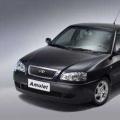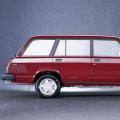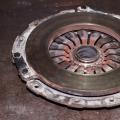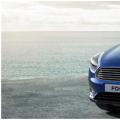Fuel tank - 46 l.
Engine lubrication system: CR14DE - API SG, SH, SG. ILSAC group GF-I or GF-II. ACEA A2
HR16DE - API SL. ILSAC group GF-III.
CR14DE, including the oil filter - 3.4 liters.
CR14DE, excluding oil filter - 3.2 liters.
HR16DE, including the oil filter - 4.6 liters.
HR16DE, excluding oil filter - 4.4 liters.
Cooling system (based on expansion tank capacity): Genuine Anti-freeze Coolant 250 engine cooling fluid
CR14DE, without air conditioning - 4.9 liters.
CR14DE, with air conditioning - 5.3 liters.
HR16DE, without air conditioning - 5.6 liters.
HR16DE, with air conditioning - 6.0 l.
HR16DE, with automatic gearbox - 5.4 liters.
Expansion tank:
CR14DE, without air conditioner - 0.7 l.
CR14DE, with air conditioning - 1.2 liters.
HR16DE, without air conditioner - 0.7 l.
HR16DE, with air conditioning - 1.2 liters.
HR16DE, with automatic gearbox - 0.7 l.
Gear oil for manual transmission - 2.6 liters. (NISSAN or API GL-4 Transimmission Oil, SAE 75W-80 Viscosity Grade)
Working fluid for automatic transmission - 7.7 liters. (NISSAN ATF working fluid)
Washer fluid - 4.6 liters.
Refrigerant for air conditioning system: Refrigerant HFC-134a (RFC-134a)
CR14DE - 475 gr.
Nissan Note is a compact family car, produced since 2004. The car is designed on the platform that is used in the Renault Modus, Renault Symbol, Nissan Tiida, as well as Renault Logan and Nissan Platina. The first generation model was produced for the Japanese and British markets. Among the closest competitors of Nissan Note are the Citroen C3 Picasso, Honda Freed and Ford B-Max. In addition, the car is in the same class with compact vans Ford Fusion, Fiat Idea, Opel Meriva, Mitsubishi Colt and Honda Jazz.
The model debuted in the Japanese market in 2004, and sales began in 2005. In Europe, the car was first presented in Frankfurt in 2005, and the Geneva premiere took place in 2006. The production of the compact van is organized in the British Sunderland. In the Russian market, the car was offered in the Comfort, Luxury and Tekna trim levels. Already in the basic version, the car received two airbags. The Russian range of engines is represented by engines 1.4 and 1.6 liters, with a capacity of 88 and 110 liters. with. respectively. Transmissions - mechanical 5-speed, as well as automatic 4-speed.
Nissan Note Hatchback
Restyling of Nissan Note was carried out in the period 2005-2012. The car did not receive significant changes, with the exception of the appearance of extended trim levels and design improvements.
In 2012, sales of the second generation of the compact van began. The production model was the inspiration for the Nissan Invation concept car unveiled at the 2012 Geneva Motor Show. The motor range of the "second" Note is represented by engines of 1.2 liters, with a capacity of 79, 80 and 98 liters. with., as well as a 1.6-liter 138-horsepower engine. There is also its version derated to 109 forces, as well as the only 1.5 liter diesel engine for 90 forces.
hatchback, number of doors: 5, number of seats: 5, dimensions: 4100.00 mm x 1695.00 mm x 1535.00 mm, weight: 1185 kg, engine displacement: 1198 cm 3, number of cylinders: 3, maximum power: 80 hp, maximum torque: 110 Nm @ 4000 rpm, acceleration from 0 to 100 km / h: 13.70 s, top speed: 170 km / h, gears (mechanical / automatic): 5 / -, fuel: petrol, fuel consumption ( city \u200b\u200b/ highway / mixed): 5.9 l / 4.0 l / 4.7 l, wheels: R16, tires: 195/55 R16
Brand, series, model, years of production
Basic information about the manufacturer, series and model of the vehicle. Data on the years of its release.
Body type, dimensions, volumes, weight
Information about the car body, its dimensions, weight, trunk volume and fuel tank volume.
| Body type | hatchback |
| Number of doors | 5 (five) |
| Number of seats | 5 (five) |
| Wheelbase | 2600.00 mm (millimeters) 8.53 ft (ft) 102.36 in (inches) 2.6000 m (meters) |
| Front track | 1480.00 mm (millimeters) 4.86 ft (feet) 58.27 in (inches) 1.4800 m (meters) |
| Back track | 1485.00 mm (millimeters) 4.87 ft (feet) 58.46 in (inches) 1.4850 m (meters) |
| Length | 4100.00 mm (millimeters) 13.45 ft (feet) 161.42 in (inches) 4.1000 m (meters) |
| Width | 1695.00 mm (millimeters) 5.56 ft (ft) 66.73 in (inches) 1.6950 m (meters) |
| Height | 1535.00 mm (millimeters) 5.04 ft (ft) 60.43 in (inches) 1.5350 m (meters) |
| Minimum trunk volume | 325.0 l (liters) 11.48 ft 3 (cubic feet) 0.33 m 3 (cubic meters) 325000.00 cm 3 (cubic centimeters) |
| Maximum trunk volume | 1495.0 l (liters) 52.80 ft 3 (cubic feet) 1.50 m 3 (cubic meters) 1495000.00 cm 3 (cubic centimeters) |
| Curb weight | 1185 kg (kilograms) 2612.48 lbs (lbs) |
| Maximum weight | 1510 kg (kilograms) 3328.98 lbs (lbs) |
| Fuel tank volume | - |
Engine
Technical data about the car's engine - location, volume, cylinder filling method, number of cylinders, valves, compression ratio, fuel, etc.
| Fuel type | petrol |
| Fuel supply system type | multipoint injection (MPFI) |
| Engine location | front, transverse |
| Engine volume | 1198 cm 3 (cubic centimeters) |
| Gas distribution mechanism | - |
| Pressurization | naturally aspirated engine (naturally aspirated) |
| Compression ratio | - |
| Arrangement of cylinders | inline |
| Number of cylinders | 3 (three) |
| Number of valves per cylinder | - |
| Cylinder diameter | - |
| Piston stroke | - |
Power, torque, acceleration, speed
Information about maximum power, maximum torque and rpm at which they are achieved. Acceleration from 0 to 100 km / h. Maximum speed.
| Maximum power | 80 h.p. (British horsepower) 59.7 kW (kilowatts) 81.1 h.p. (metric horsepower) |
| The maximum power is reached at | - |
| Maximum torque | 110 Nm (Newton meters) 11.2 kgm (kilogram-force-meters) 81.1 lb / ft (lb-ft) |
| Maximum torque is achieved at | 4000 rpm (rpm) |
| Acceleration from 0 to 100 km / h | 13.70 s (seconds) |
| Maximum speed | 170 km / h (kilometers per hour) 105.63 mph (miles per hour) |
Fuel consumption
Information about the rise of fuel in the city and on the highway (urban and suburban cycle). Mixed fuel consumption.
| Fuel consumption in the city | 5.9 l / 100 km (liters per 100 km) 1.30 imp.gal./100 km 1.56 US gal / 100 km 39.87 miles / gallon (miles per gallon) 10.53 miles / liter (miles per liter) 16.95 km / l (kilometers per liter) |
| Fuel consumption on the highway | 4.0 l / 100 km (liters per 100 km) 0.88 imp.gal./100 km (imperial gallons per 100 km) 1.06 am gal / 100 km (US gallons per 100 km) 58.80 mpg (miles per gallon) 15.53 miles / liter (miles per liter) 25.00 km / l (kilometers per liter) |
| Fuel consumption - mixed | 4.7 l / 100 km (liters per 100 km) 1.03 imp.gal./100 km (imperial gallons per 100 km) 1.24 US gal / 100 km (US gallons per 100 km) 50.05 mpg (miles per gallon) 13.22 miles / liter (miles per liter) 21.28 km / l (kilometers per liter) |
| Environmental standard | EURO V |
| CO 2 emissions | 109 g / km (gram per kilometer) |
Gearbox, drive system
Information about the transmission (automatic and / or manual), the number of gears and the drive system of the vehicle.
Steering gear
Technical data on the steering gear and the turning circle of the vehicle.
Suspension
Information about the front and rear suspension of the vehicle.
Wheels and tires
Type and size of wheels and tires of the car.
| Disk size | R16 |
| Tire size | 195/55 R16 |
Comparison with mean values
The difference in percentage between the values \u200b\u200bof some vehicle characteristics and their average values.
| Wheelbase | - 3% |
| Front track | - 2% |
| Back track | - 1% |
| Length | - 9% |
| Width | - 5% |
| Height | + 2% |
| Minimum trunk volume | - 28% |
| Maximum trunk volume | + 8% |
| Curb weight | - 17% |
| Maximum weight | - 23% |
| Engine volume | - 47% |
| Maximum power | - 50% |
| Maximum torque | - 59% |
| Acceleration from 0 to 100 km / h | + 34% |
| Maximum speed | - 16% |
| Fuel consumption in the city | - 41% |
| Fuel consumption on the highway | - 35% |
| Fuel consumption - mixed | - 37% |




